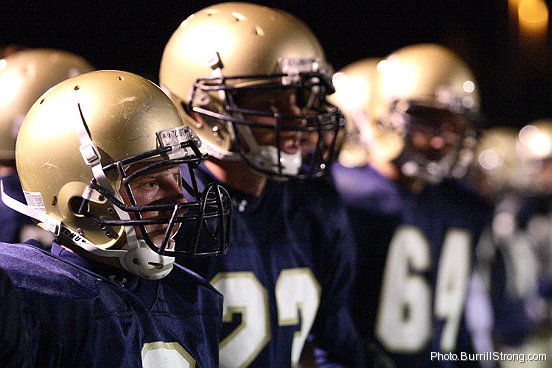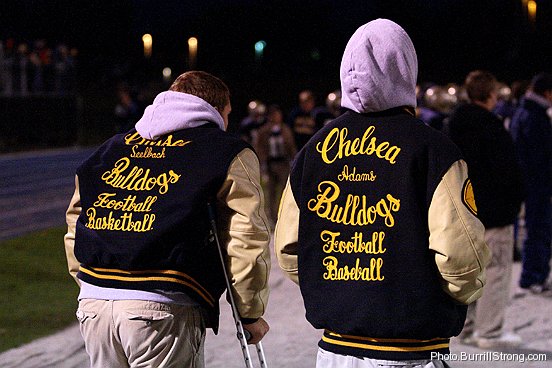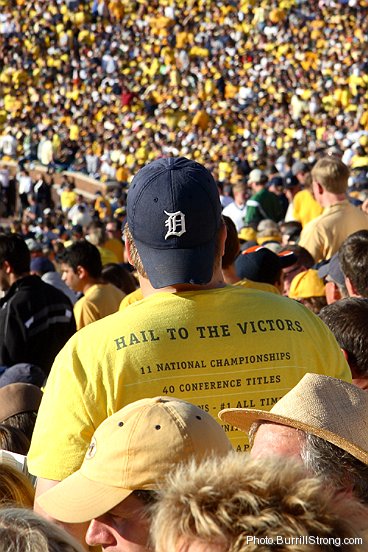Family (14 October 2006).

Monthly Archives: October 2006
Baseball math… part 3; You can join us, but only for a little while
1)It’s a pattern, like argyle, except it’s bad
One more thought on the expansion of MLB’s already long season: on Saturday, 14 October 2006, the Tigers won game 4 of the ALCS to complete their sweep of the A’s; on that same day in 1984, they won the World Series. The 2006 World Series will not even start until 21 October.
Also, it seems three extra rest days will be introduced into the 2007 MLB season. It has not yet been determined whether they will be added to the regular season or the postseason. In either case, next season will be even longer.
2)Wait, don’t you know you’re supposed to lose?
In another baseball note, there is talk of making the postseason more difficult for wild card teams. One idea being floated is to give wild card teams only one home game in the first round, rather than two.
I fail to understand this line of thought. Having wild cards win division, conference and even World series is not a problem — not unless wild cards themselves are problems. The last few years have featured a wild card team in the World Series, and somehow this is a problem for baseball?
Bud Selig: either keep the wild cards and consider them full participants in the postseason, or drop the wild cards altogether. Do not make the wild cards second-class postseason citizens. If they meet your wild card criteria, then they deserve to be in the playoffs. The only fair choice is between wild cards and no wild cards.
The 2006 Tigers have won playoff games fair and square, and previous wild card teams have done the same. If these Tigers and the previous successful wild card teams don’t belong in the playoffs, then the playoff critera — not the wild card teams — are the problem. Don’t punish wild card teams for meeting the current playoff standards.
I predict Michigan will go undefeated in 1997
A caller on a sports talk radio show today said:
“You can’t predict the future, but you can predict the past.”
Photo of the Variable Time Period, vol. 17
Watchful (13 October 2006).

Photo of the Variable Time Period, vol. 16
In the span of just over one week, Chelsea lost two quarterbacks to injury: first Seelbach, then Adams. They both were unwilling spectators as Chelsea narrowly defeated Ann Arbor Pioneer.
Fifty cents (13 October 2006).

News
The 09 October post, “Hitting the fan,” has been published as a letter to the editor in the 12 October Chelsea Standard.
Also, I will soon have news concerning the publication of some of my pictures of Living Water Community Church‘s recent Biker Sunday. Stay tuned.
Photo of the Variable Time Period, vol. 15
This was a common sight at Michigan Stadium on Saturday; Michigan’s game against Michigan State coincided with the Tigers’ game 4 against the Yankees. Both Michigan and the Tigers won handily.
Go Blue — both of them (07 October 2006).

Three roommates… part 4; Baseball math… part 2
Heads, I get the stadium; tails, you get it
More facility-sharing fun from the world of professional sports. With the Twins out of the postseason, the Vikings have the Metrodome to themselves; however, in Oakland, the Raiders still have to worry about the A’s postseason schedule. If the A’s advance to the World Series, a Raiders game would be postponed to accomodate a Sunday baseball game; if the A’s lose to the Tigers, then the Raiders’ schedule would remain intact.
Of course, we who are rooting for the Tigers are doing so only out of concern for the Raiders and their well-being.
Apparently baseball is subject to inflation, too
If the baseball season seems long, there’s a simple reason: it is. Consider this: in 1945 and 1968, the Tigers won World Series game 7s on October 10 — the very same day they played game 1 of the 2006 ALCS. The 2006 World Series doesn’t even start until 21 October, 11 days after the end of the 1945 and 1968 postseasons.
In related news, days are now only 20 hours, rather than the traditional 24 hours.
A sentence composed on a computer that’s well-written
From the Houston Chronicle, 01 September 2006:
“It’s music recorded in a bedroom that’s intellectually challenging and fun to listen to.”
Unfortunately, reviewers found the dining room rather simplistic and unengaging.
The past is now, vol. 2
01 June (2005)
If Nothing Is Written, Nothing Will Be Written, or
I Write What I Write, Whatever I Write
I love to listen to sports figures try to talk without saying anything. It’s like listening to politicians, except the subject matter is a game. The most typical non-answers come during the ridiculous halftime interviews, when coaches say things like, “Well, we need to score more,” or, “We need to make some stops.” Other non-answers come during press conferences when the coach is being pressed to make a decision (such as naming a starter) and he doesn’t want to reveal his decision (or he just doesn’t want to make one yet).
One of my favorite examples of sportspeak came from that type of situation, and it was uttered by Michigan football coach Lloyd Carr. In addressing a question concerning the quarterback situation one year, he said:
“If nothing changes, nothing will change.”
Of course, as Ben Wallace of the Detroit Pistons recently demonstrated, coaches aren’t the only people who know sportspeak. Players can speak the language, too. Wallace was being questioned about the rumors of Pistons coach Larry Brown’s decision to accept a front office job with Cleveland. (Brown has testily denied such rumors.) In answering the questions, Wallace said:
“It is what it is, whatever it is. Do I believe the rumors? It is what it is.”
Don’t you feel so informed now? If nothing changes, nothing will change, and it is what it is, whatever it is.
